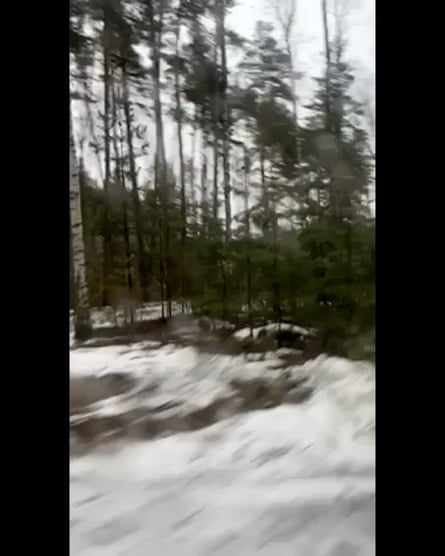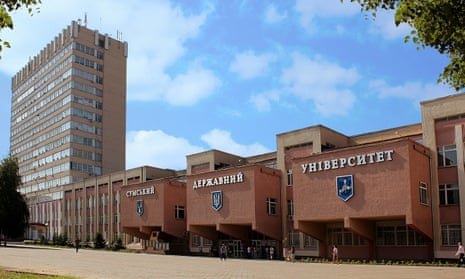Against a constant backdrop of shelling and air raids, more than 1,200 international students remain trapped in the besieged city of Sumy, eastern Ukraine. Diplomatic efforts to evacuate them and create a safe corridor appear to have stalled.
Many of the students have run out of water, resorting at times to boiling ice, and are running out of food. In their desperation, many are contemplating taking a treacherous journey out of the city to Poltava, 110 miles to the south.
Ukrainian soldiers have warned students who have tried to leave to stay in the hostels. The journey passes dangerously close to the fighting on the outskirts of Sumy. Yet some students have felt they had no choice.
Last Thursday Oluwaseun Adefemi, a Nigerian medical student in his 20s, and three of his friends paid a driver $1,600 (£1,220), several times the usual fee, and fled.
“My heart was pounding, I didn’t know what to do, but I knew I had to leave. The main route to the city had been bombed, the train station had been bombed. But we finally heard that there was another route through the forests,” he said.
“That day the driver just called me to say that he’s in front of the hostel. I hadn’t showered, I hadn’t brushed my teeth, my luggage wasn’t packed. I basically left everything, I just packed my documents and we started running down to the car.”
At checkpoints controlled by Ukrainian soldiers, the driver told troops he was taking the students to a safety zone close to the outskirts of the city.
“Then, when we started getting to the outskirts everything looked so much more real. There were destroyed armoured tanks, destroyed buses. Stains of blood everywhere on the ground. Cars that were mashed up, like armoured tanks drove over them.
“There was a burial, by some soldiers. I couldn’t tell which soldiers they were but they were burying someone.”

Then they drove, speeding through the snow-covered forest, parallel to main roads to Poltova that were not safe to drive on.
“At times you could see the main roads through the forest. We saw armoured tanks, soldiers delivering weapons. Sometimes we saw that they were Ukrainians, because they had a band around their arm in the colour of their flag.
“Sometimes we saw young people, 18, 19, 20 years old, holding guns, ready to fight. We didn’t follow routes where we thought the Russians were. I was 80 or 90% sure that if they saw us we would be shot on sight.”
Adefemi’s driver was a 36-year-old Ukrainian. “He was tense. It was obvious he was afraid. He was going at outrageous speeds. The ground was covered in snow, he was trying to keep the car in control while speeding.”
For large spells of the journey they lost network and were “driving blind” through forestry.
After two hours of driving, they finally reached a nearby city where things felt calmer. “We wound down the windows. He played music, something Ukrainian. He relaxed, the speed reduced, he looked calm. We were getting close to Poltava.”
The following day Adefemi travelled to the Hungarian border and on Sunday he arrived in Budapest, where he is staying with a relative. The journey felt like an “impossible mission” he said, with several points where it felt they could be speeding into military conflict.”
‘We are stuck’
Renish Joseph, from Kerala, India, is a student coordinator at Sumy State University and has lived in Ukraine for 10 years. He is currently sheltering in the university hostel with his Ukrainian wife and their two-month-old baby. He said there had been no running water in the hostel for days and tensions were running high.
“Things are bad here, tomorrow will be our 15th day,” said Joseph. “These are students who are just 17 or 18 years old, this is the first time in their lives they are facing anything like this situation. This war comes after two years of dealing with Covid so physically and mentally the students are very depressed and very tired.
“Every day they’re hoping that today they will be evacuated and then when it doesn’t happen, they’re getting more and more depressed and losing all hope. Some students have started experiencing bad psychological problems. At night, they will start crying or pacing around.”
With no running water for drinking, showers or toilets, Joseph said the students were reliant on volunteers who came into the hostel every day with thousands of litres of water. “The students are collecting it in water bottles and using it for everything, drinking and personal hygiene. It’s desperate.”
He said they went out for food early in the mornings but had to queue for hours outside supermarkets in freezing temperatures and food supplies inside stores were running low.
So far, Jospeh said fighting had remained on the peripheries of Sumy and was not in the city, but he was concerned that a perception among locals that foreign students may be wealthy could put them at risk.
“Everybody has a gun and we are worried because we are foreigners with brown skin so we are very visible and so anything can happen to us,” he said.
“We are safe for now but we have heard that looting has already started so I don’t think we will be safe here much longer.”
While the Indian government have announced an evacuation plan to get the students out via the polish border town of Poltava, which is around 150 miles away, and told them to be “ready at short notice”, so far it has been too dangerous to implement. Speaking at the UN security council meeting on Monday, TS Tirumurti, India’s permanent representative at the UN, said that India was “deeply concerned that despite our repeated urgings” to both Russia and Ukraine, the “safe corridor for our students stranded in Sumy did not materialise.”
“There are only four to five routes which we can leave the city and all are blocked by fighting,” said Joseph. “The Russian border is only 40km [25 miles] away, but we cannot travel to Russia because Ukrainians will not allow it. So we are stuck.”
